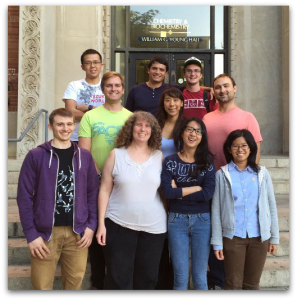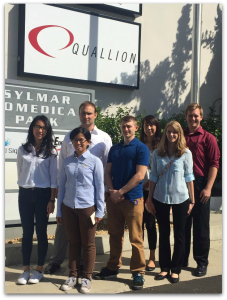
Front: Ben Lesel, Sarah H. Tolbert, Clair Shen, Yan Yan
Middle: Ty Karaba, Terri Lin, John B. Cook
Back: Allen Liang, Erick Harr, Dan Baumann
With collaboration opportunities and innovative workshops, the newly established UCLA student chapter is providing both social and academic experiences for those involved.
Since its approval at the 228th ECS Meeting, the UCLA student chapter has been hard at work creating a robust, multifaceted group where students from all areas of electrochemical science can come together.
“Science, at the entry level, progresses much more efficiently when there is an open dialogue between researchers,” says John Cook, chair of the UCLA student chapter. “Electrochemical science cannot be done alone in a dark room.”
Cook and a collaborator began developing the UCLA student chapter very organically, with the idea that there needed to be a way to bring together the many groups across the campus working in electrochemistry. For Cook, establishing an ECS student chapter was the perfect solution.
“Our main goal is to bring people from different departments together to share ideas,” says Cook. “We want to create an environment in which chemists, engineers, physicists, and even business majors collaborate and share ideas.”
Currently, the group hosts a weekly journal discussion, where students review scientific literature published in ECS and other highly respected journals.
“Hosting events such as the journal club and other outreach events not only allows student to be updated on the latest research and share their knowledge,” says Cook, “but it also motivates students to reflect on their own research and build connections with their peers to encourage collaboration.”
Among their future activities, the student chapter will be running a booth at the upcoming UCLA Explore Your Universe event, which has traditionally been well attended by younger kids and their parents.
“Our booth will demonstrate fundamental electrochemical properties using the zinc plating experiment, and the simple Volta pile that can be made by the attendees at home from loose change,” says Cook. “We are even going to freeze a battery with liquid nitrogen to demonstrate the decay of mass transport as a function of temperature.”
With the UCLA student chapter’s outreach in education and the uniting of student researchers across multiple platforms, Cook believes the group will continue to grow and thrive as it matures.
Learn more about student chapters and other student opportunities.


